| | | | | | | Presented By Babbel | | | | Axios World | | By Dave Lawler · Jul 21, 2022 | | Welcome back to Axios World. - Tonight's edition (1,926 words, 7 minutes) focuses on what's next in Ukraine and comes to you from a hot and stormy Washington, D.C. Thanks as always for reading.
- Heads-up: Axios China will now be coming to you from Taiwan. My brilliant colleague Bethany Allen-Ebrahimian is now our first staff correspondent in the region. Subscribe.
| | | | | | 1 big thing: Putin's next move could reshape the war | 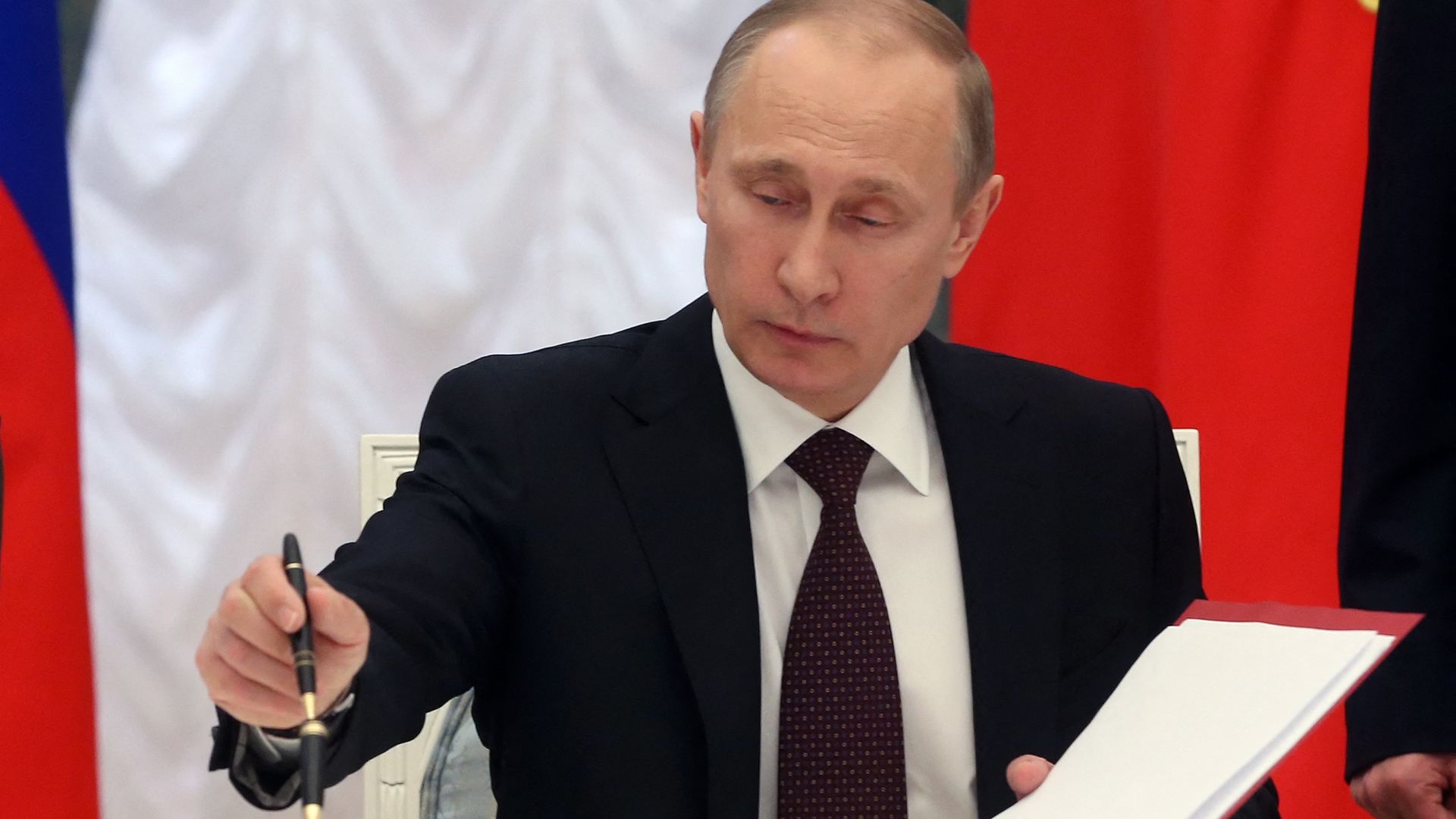 | | | Putin signs a decree absorbing Crimea in 2014. Photo: Sergei Chirikov/Pool via Getty | | | | If the Kremlin follows through with its purported plans to annex large swaths of southern and eastern Ukraine, as the White House expects, it could fundamentally shift the stakes of the war and make a negotiated settlement all but impossible. Why it matters: Kyiv and its western backers hope an influx of NATO-caliber weaponry will allow Ukraine to reverse Russia's gains. But if Russia follows the "playbook" the White House laid out this week, Moscow will claim that fighting is now taking place on Russian soil. Driving the news: White House spokesperson John Kirby said Tuesday that the U.S. has intelligence indicating the Kremlin is "reviewing detailed plans" to annex four Ukrainian oblasts, or regions: Kherson, Zaporizhzhia, Donetsk and Luhansk. - A senior German official tells Axios they share the U.S. assessment about planned annexations.
From Vladimir Putin's perspective, annexing the four regions dramatically raises the stakes of defending them — and potentially the tools he's willing to use to do so. - Western countries would never recognize such annexations, but the move could scramble the risk-reward calculus for providing arms and political support.
- For Ukraine, the threat is more existential: partition, long-term destabilization and the demise of any possible peace deal. It also increases the incentive to counterattack now, before Russia can put any annexation plans into practice.
The big picture: The four oblasts are contiguous and would link Crimea, which Moscow annexed in 2014, to Russia. - Russian forces took Kherson and Zaporizhzhia in southern Ukraine in the early days of the war. Then, after failing to capture Kyiv, they launched a massive offensive in the Donbas region of eastern Ukraine.
- Putin claimed full control of Luhansk earlier this month and is now turning his attention to Donetsk.
- Russian Foreign Minister Sergei Lavrov acknowledged Wednesday that Russia's military ambitions extend beyond the Donbas, to Kherson, Zaporizhzhia and "a number of other territories" — including potentially Ukrainian-held territory to the West.
Zoom in: In Russian-held Kherson, Russia has installed a puppet government, restricted the internet, mandated the use of the ruble and started issuing Russian passports. - Kirby said the U.S. believes the next steps of the "annexation playbook" will include a fraudulent referendum on joining Russia, perhaps in mid-September to align with regional elections in Russia.
- Kirby vowed the U.S. and its allies would respond with stiff sanctions and added, "We would remind Mr. Putin that over time he may prove unable to hold this territory."
Such an audacious move would actually be a "logical next step" for Putin, contends Alexander Gabuev, a Russia expert at the Carnegie Endowment. - Knowing that Ukraine seeks to retake these territories, Putin could up the ante by immediately bringing them under the Russian nuclear umbrella and responding to any Ukrainian counteroffensive with the threat of a tactical nuclear strike, Gabuev says.
- "I think the calculation is that this will be the defining moment where the Western leaders will get very cautious and the goals will shift from retaking all of the pre-Feb. 24 possessions to keeping what Zelensky has right now," Gabuev says.
The other side: By declaring a massive chunk of Ukraine to be part of Russia, Putin would effectively be committing to a large, sustained military presence inside Ukraine and risking embarrassment if Ukrainian counterattacks prove successful. - But it could also further his objectives of keeping Ukraine divided and weak and placing wedges between Kyiv and its Western backers — and between those backers themselves.
- That's a bet Putin may be willing to make. "The risk appetite of this guy is very different from the risk appetite of Joe Biden," Gabuev says.
|     | | | | | | Part II: A hinge moment for Ukraine |  The annexation threat comes during a "transitional phase" of the war, says Michael Kofman, a leading expert on Russia's military at CNA. State of play: Russia has been utilizing its artillery advantage over the last three months to make gradual progress in the Donbas. - CIA director Bill Burns said Wednesday that perhaps 15,000 Russian soldiers have been killed and 45,000 wounded in the war. While Burns says Kyiv's losses are likely "a little less than that," they include some of Ukraine's best-trained troops.
- But Ukraine is now hitting back with longer-range artillery of its own. The Russian offensive doesn't seem to be over, Kofman says, but it hasn't yielded any clear progress over the past two weeks.
"I think they're about to run out of steam," MI6 director Richard Moore said today at the Aspen Security Forum. "Our assessment is that the Russians will increasingly find it difficult to supply manpower and materiel over the next few weeks." - The Ukrainians, meanwhile, have been conducting small-scale counteroffensives, including around Kherson city.
- "It looks very clearly like a positional game in order to put themselves in place for an offensive down the line," Kofman says, noting that Ukrainian forces are doing the same in southern Donbas and in Zaporizhzhia.
What to watch: Ukraine has a clear incentive to make its move before September to try to disrupt any Russian annexation plans. - Russia, meanwhile, seems to be attempting to secure the boundaries of Kherson and the other oblasts it controls without pushing beyond them, Kofman says, potentially setting the stage for annexation.
- "They would be taking a huge risk trying to annex Kherson because they might lose a large part of it," he says. Kofman thinks the Kremlin may wait until the military outlook in Kherson is clearer before announcing its next moves.
|     | | | | | | Part III: Where annexations would leave the war | 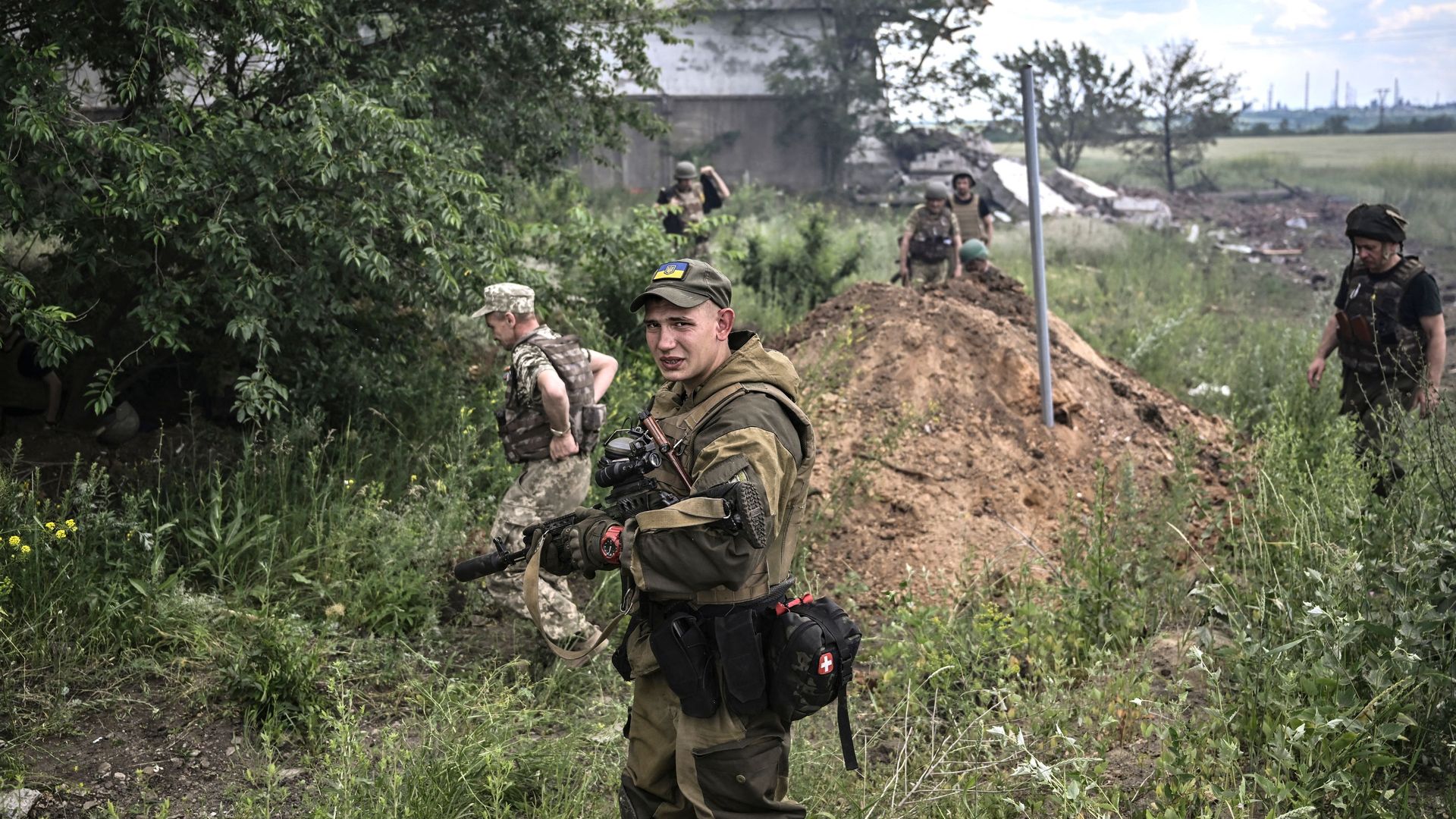 | | | Ukrainian soldiers on patrol in the Donbas region. Photo: Aris Messinas/AFP via Getty | | | | Because the U.S. wouldn't recognize the annexations, the Biden administration's position on the deployment of U.S.-made weaponry — which Kyiv has promised only to use on Ukrainian soil — is unlikely to change. - But if the Kremlin sets new red lines, all sides will have to reconsider their own risk calculus.
- While Ukrainian President Volodymyr Zelensky would presumably want to fight full force, Gabuev says, some European countries could feel differently with nuclear weapons on the table and Putin threatening to throttle the gas supply.
Russian annexations would certainly change the diplomatic calculus. - Western officials have expressed hope that their arms shipments will help create a more favorable status quo, allowing Ukraine to negotiate a cease-fire from a position of strength.
- But Zelensky has vowed not to sign a deal that cedes territory to Russia — let alone nearly one-fifth of the country.
Where it stands: Lavrov said Wednesday that now is not the time for peace talks. It remains unclear whether it ever will be, as far as Putin is concerned. - Burns noted that Putin repeats in private what he's said in public: "Ukraine is not a real country" and "it's his entitlement, Russia's entitlement, to dominate Ukraine."
The bottom line: Annexations could be one step in that direction. But they could also be one more bad bet from a Russian leader who has already made several in this war. |     | | | | | | A message from Babbel | | Prepare for your next summer adventure with Babbel | | |  | | | | This summer — whether you're preparing for a trip abroad or looking for a new hobby — you could be speaking a new language in three weeks with Babbel. Even better: Explore the culture behind the language with special courses on topics like sports, travel, festivals and more. Get up to 60% today. | | | | | | Bonus: Where in the world? | 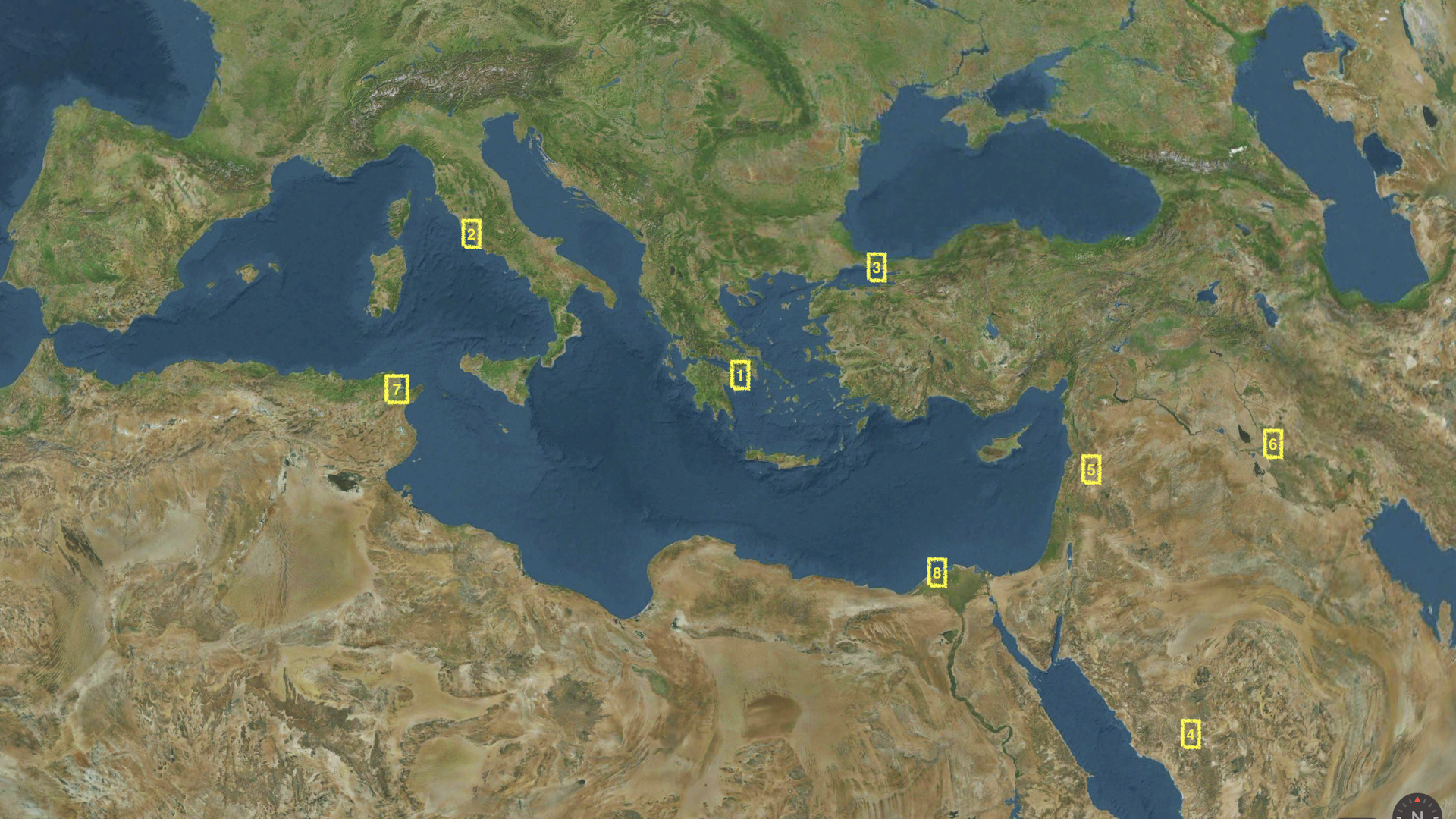 | | | Screengrab via Apple Maps | | | | Today's category is ancient capitals that are still on the map. Can you name all 8? - Capital of an eponymous ancient empire, still a major city.
- Capital of an eponymous ancient empire, still a major city.
- Capital of the Byzantine empire. Still a major city, renamed in 1930.
- First capital of the first Islamic Caliphate (7th century), still a major city
- Capital of the Umayyad Caliphate (A.D. 661–744), still a major city.
- Capital of Abbasid Caliphate (A.D. 750-1258), still a major city.
- Capital of an eponymous empire. Its ruins now lie in a municipality of the same name.
- Capital of the Ptolemaic Kingdom, still a major city.
Scroll to the bottom for the answers. |     | | | | | | 4. Global news roundup | 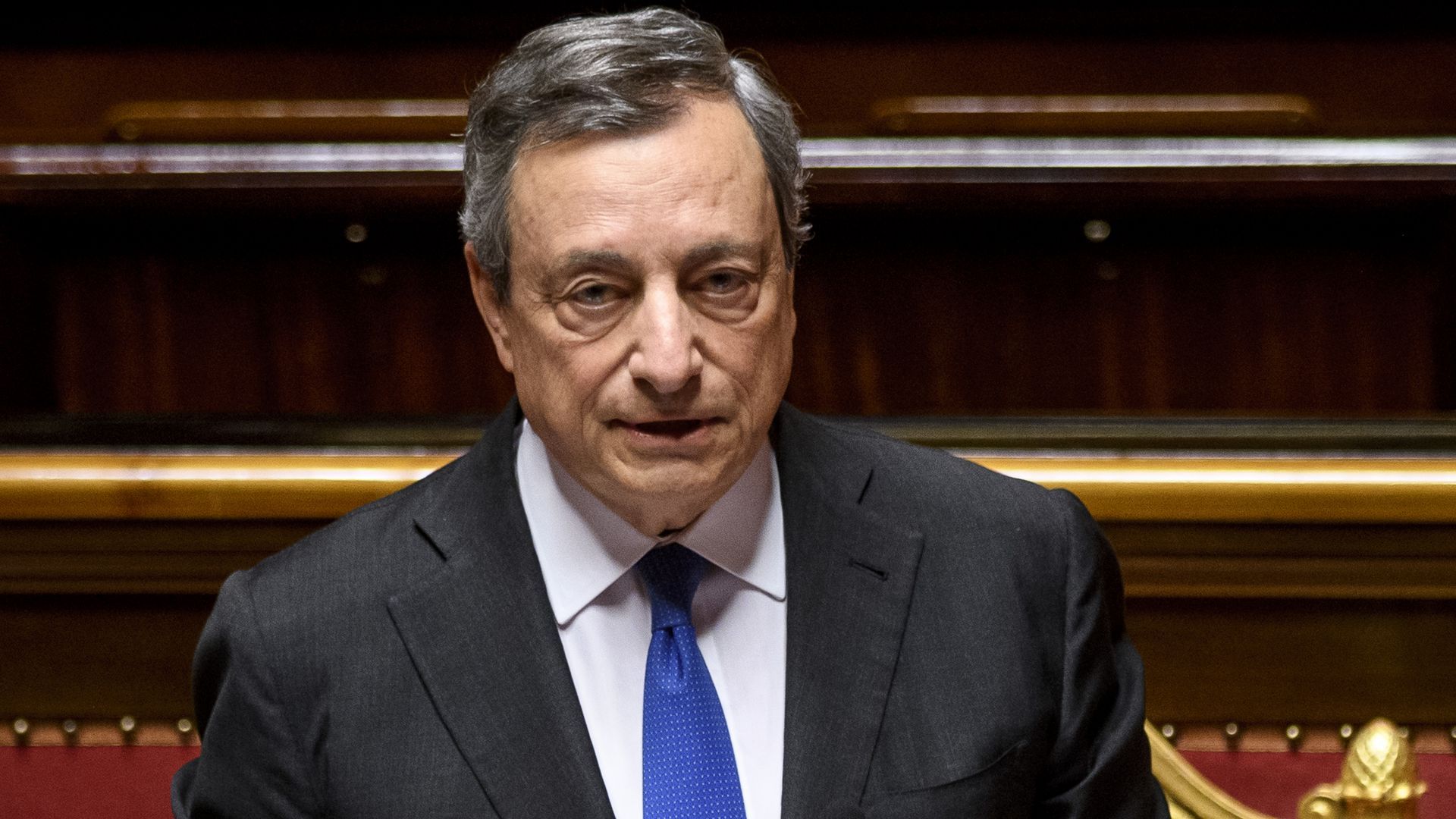 | | | Mario Draghi. Photo: Antonio Masiello/Getty Images | | | | 1. Italian Prime Minister Mario Draghi resigned today after his coalition imploded, setting up a new period of political chaos and fresh elections, likely in October. - Draghi, probably Europe's most respected technocrat, was an economic reformer, Brussels-backer and proponent of aid to Ukraine. Current polls, which show the far-right on top, suggest his successor might not be.
2. Ranil Wickremesinghe was sworn in today as Sri Lanka's new president. - A fixture of Sri Lanka's establishment, he is deeply distrusted by the protesters that brought down his predecessor.
3. The race to replace Boris Johnson as U.K. prime minister and Conservative Party leader is down to two: former Finance Minister Rishi Sunak and Foreign Secretary Liz Truss. 4. Iraq's government says Turkey is responsible for Wednesday's artillery strikes at a tourist resort in Iraqi Kurdistan that killed at least nine civilians. - Turkey, which has been conducting a cross-border offensive against Kurdish groups it considers terrorists, denied responsibility.
5. Putin discussed oil production in a call today with Saudi Crown Prince Mohammed bin Salman, less than a week after President Biden's visit to Saudi Arabia. 6. Spain, Portugal and Greece today rejected an EU proposal for all member states to cut their gas consumption by 15% through next spring to preserve supply throughout the winter, especially for countries like Germany that are heavily reliant on Russian gas. - Evoking Berlin's approach to the eurozone crisis a decade earlier, Spain's energy minister said, "Contrary to other countries, Spain hasn't been living beyond its means in energy terms."
7. The recent murders of two women in Egypt and Jordan have sparked outrage across the Middle East and calls for greater legislative reforms to protect women who face a daily reality of gender violence and discrimination, Axios' Ivana Saric reports. |     | | | | | | 5. "Catastrophic" hunger in East Africa | 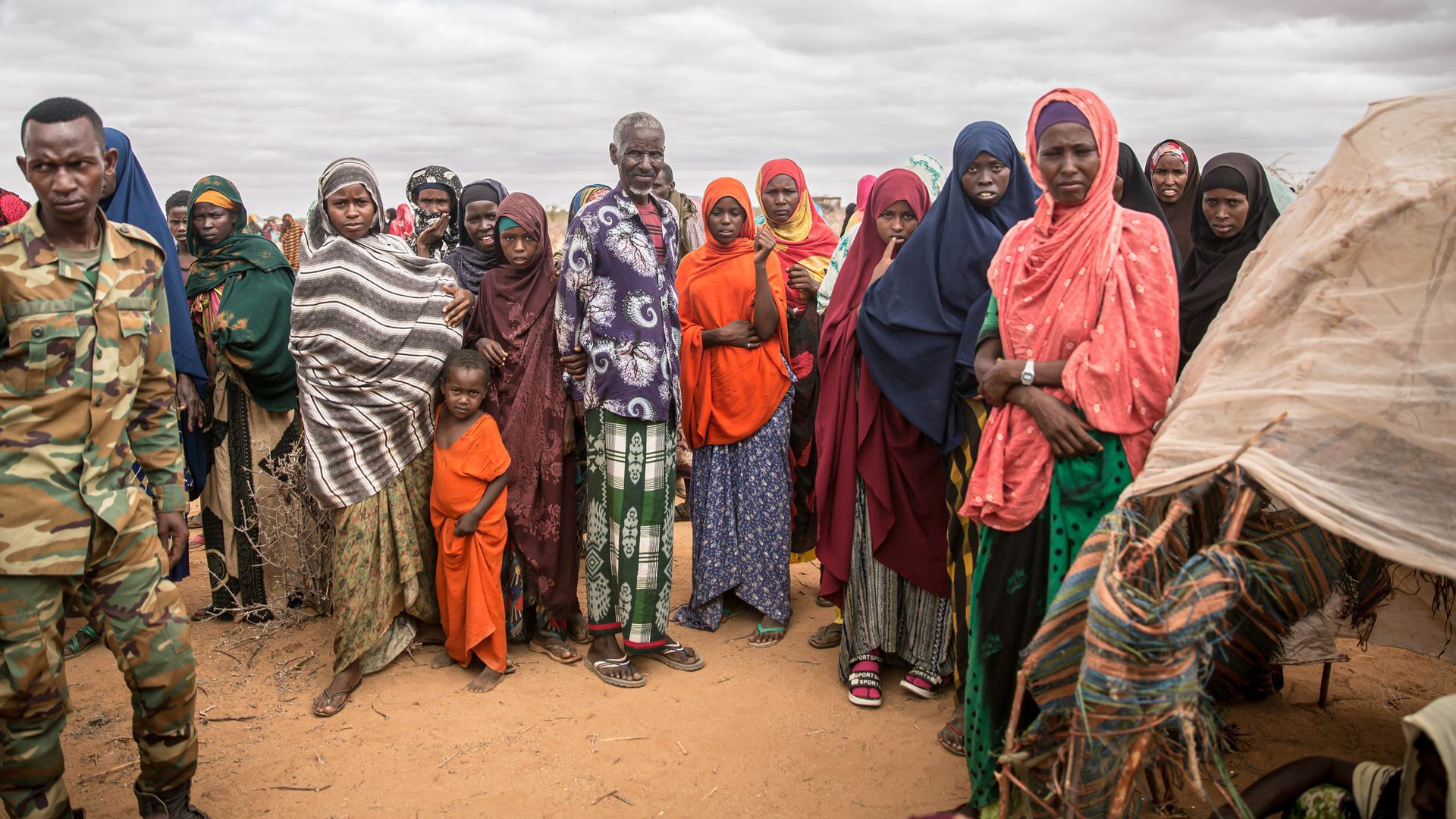 | | | People displaced due to the drought wait for assistance in a camp on the outskirts of Dollow, Somalia. Photo: Sally Hayden/SOPA Images/LightRocket via Getty Images | | | | Aid groups are sounding the alarm about the worsening conditions in East Africa, where a prolonged drought and rising food prices exacerbated by the war in Ukraine are making severe humanitarian crises even more dire, Axios' Laurin-Whitney Gottbrath writes. What's happening: An estimated 20 million people across the region will go hungry by September, with at least 3 million facing "emergency and catastrophic levels of hunger" and possible death if the international community doesn't deliver urgently needed aid, the International Rescue Committee warned this week. - Together Kenya, Ethiopia and Somalia represent 2% of the world population but 70% of extreme food insecurity, IRC president David Miliband said in a speech this week.
Driving the news: The worst drought the region has seen in decades, ongoing conflict and the pandemic-driven economic crisis have contributed to the dire humanitarian situation in the Horn of Africa region. - At the same time, Russia's invasion of Ukraine has accelerated the crisis by driving up the prices of food, fertilizer and fuel.
- Ukraine and Russia have historically produced 90% of the wheat imported by the East Africa region, per the World Food Program.
- Aid groups welcomed recent announcements of additional aid for East Africa, including more than $1.2 billion in humanitarian assistance from USAID, but warned more is needed.
What they're saying: "There is nothing natural about famines in the 21st century. While a complex set of factors are driving extreme hunger, the slide into famine and mass death is man-made, driven by international inaction," Miliband said in a statement this week. |     | | | | | | 6. One to watch: Biden vs. Pelosi on foreign policy |  | | | Pelosi and Biden. Photo: Eric Lee/Bloomberg via Getty Images | | | | Two headlines that caught my attention in the last 24 hours. - "Biden says Pelosi's Taiwan trip 'not a good idea'" (Axios)
- "Pelosi to Blinken: Label Russia as terrorist state, or else Congress will" (Politico)
|     | | | | | | 7. Stories we're watching | 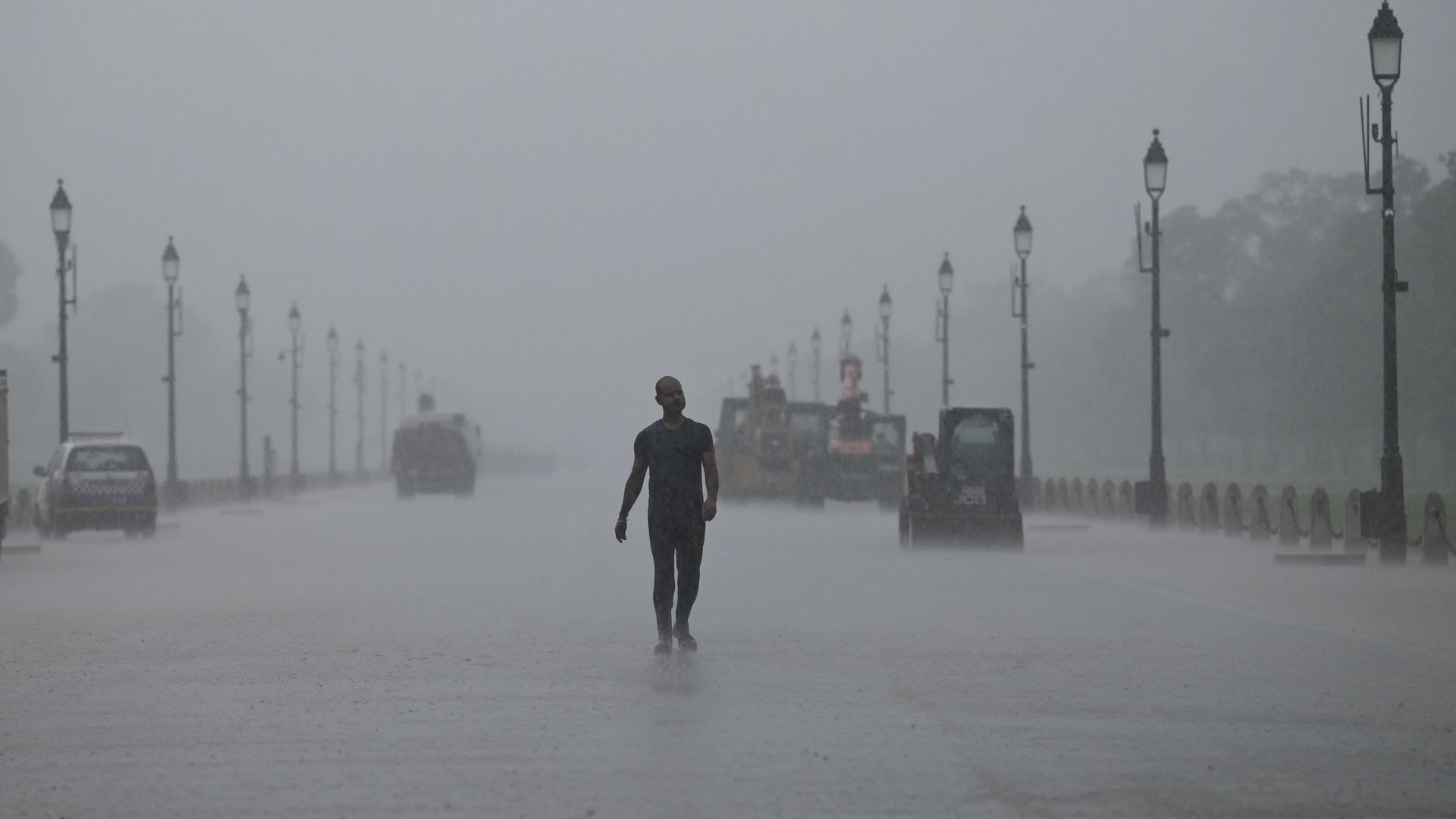 | | | Monsoon in Delhi. Photo: Money Sharma/AFP via Getty | | | - Lessons from the heat wave
- Colombia's incoming president to push police reforms
- Ukrainian first lady pleads with Congress for air defense systems
- U.S. Army faces "unprecedented" recruiting challenges
- Chinese officials sorry for break-in searches for COVID cases
- WHO weighs monkeypox declaration
- FBI "disrupts" North Korean hack
- Albania, North Macedonia begin EU accession talks
- Hezbollah threatens war over Israel maritime border dispute
- Monarch butterflies are now endangered
Quoted: "As far as we can tell he's entirely too healthy." — CIA Director Bill Burns, shooting down rumors about Putin's ill health. Burns' MI6 counterpart concurred. |     | | | | | | A message from Babbel | | Start speaking a new language in just 3 weeks | | |  | | | | Babbel helps millions of people speak and understand a new language through its scientifically proven teaching method. The deets: The platform offers multiple ways to learn a language through daily lessons, podcasts, games, live online classes and more. Get up to 60% off your subscription. | | | | Answers: 1. Athens; 2. Rome; 3. Istanbul/Constantinople; 4. Medina; 5. Damascus; 6. Baghdad; 7. Carthage; 8. Alexandria. |  | | Are you a fan of this email format? It's called Smart Brevity®. Over 300 orgs use it — in a tool called Axios HQ — to drive productivity with clearer workplace communications. | | | | | | Axios thanks our partners for supporting our newsletters. If you're interested in advertising, learn more here.
Sponsorship has no influence on editorial content. Axios, 3100 Clarendon Blvd, Arlington VA 22201 | | | You received this email because you signed up for newsletters from Axios.
Change your preferences or unsubscribe here. | | | Was this email forwarded to you?
Sign up now to get Axios in your inbox. | | | | Follow Axios on social media:    | | | | | |
Post a Comment
0Comments